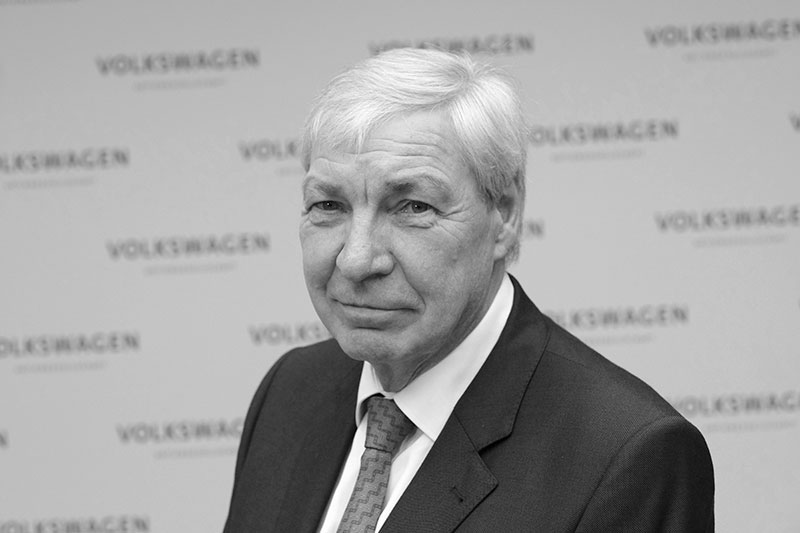
It all comes down to people
Automotive transformation: The outlook for employment in 2030

The automotive industry is in turmoil. What consequences will electromobility and digitalization have for jobs in Germany’s key industry? Fraunhofer IAO has now explored this question – using Volkswagen as an example.
The challenge
According to the media, a lot of people could lose their jobs in the automotive industry due to the current shift to electromobility in German automotive manufacturing. Do the alarming headlines contain any grains of truth? The drivetrain in an electric vehicle actually consists of significantly fewer parts than its counterpart in a conventional combustion engine. Moreover, digitalization is progressing quickly in all areas of business. A report by the National Platform Future of Mobility (NPM), an advisory board to the German federal government, assumes that the far-reaching transformation in the automotive industry – including suppliers and sub-sectors – could actually lead to hundreds of thousands of jobs being lost by 2030.
But will it really hit employment that hard? Will the shift to electromobility and growing digitalization have reciprocal effects on each other – and end up actually strengthening each other? And what consequences would that have for the job market? Will the people who lose their jobs find new ones? Initial research results regarding these questions were actually already available in Germany, including from the studies ELAB and ELAB 2.0 conducted by Fraunhofer IAO in cooperation with its partners in the automotive industry, beginning in 2010. However, these studies are based on global statistics relating to the expansion of electromobility across the whole industry. “Previously, no automotive manufacturer would have let you look behind the scenes of their production processes, because of the real planning data involved,” says Dr. Florian Herrmann, Head of the Mobility and Innovation Systems research unit at Fraunhofer IAO.
The task
That changed when the Volkswagen Group’s Sustainability Council decided to address the issue in 2019. “We wanted to investigate the exact effects of electromobility and digitalization on employment, because they have a major impact on the Volkswagen Group, economically as well as socially,” says Michael Sommer, former Chairman of the German Trade Union Confederation and member of the Volkswagen Sustainability Council. The independent advisory body commissioned the study “Employment 2030” and chose Fraunhofer IAO as a research partner. “Thanks to their experience, the experts there were ideally positioned to be able to compare theoretical findings with business practice,” says Sommer.
To give the institute access to the practical side, the Sustainability Council managed to get the company to publish its concrete planning data (as of the end of 2019) for the Stuttgart branch – for both an electric vehicle as well as a comparable model with a combustion engine. “So, we had access to concrete target figures directly from Volkswagen – and a comprehensive view into a total of 32 ‘job clusters,’” says Dr. Herrmann, who led the study by the three participating research units at Fraunhofer IAO. A job cluster, like a “machine operator” for example, includes all relevant skills within that profile.
The solution
The highly anticipated results were presented by the Sustainability Council and Fraunhofer IAO at the end of 2020. “According to the results, the expected employment losses in vehicle manufacturing due to the introduction of electromobility at VW will be far lower than predicted in previous global studies,” says Dr. Herrmann. The average staff requirement in vehicle manufacturing is set to fall by 12 per cent by the year 2029. “But that isn’t really because of the new e-car product itself,” explains Sommer. “That will be more of a trigger and catalyst for process and site optimization in various areas.”
With the advance of digitalization, a significant transformation is also expected to affect the work in functions that support production, like procurement, finance and human resources. “The employment losses there up by 2030 will be very moderate according to present assessments. Because digitalization makes things more complicated, it will even lead to an occasional growth in employment in some areas”, predicts Dr. Herrmann.
However, what will grow rapidly in the Group overall will be the demand for new knowledge and specialist expertise. “The decisive factor will be how fast and comprehensively VW can arrange for its workforce to obtain the necessary new qualifications,” opines Sommer. The necessary training strategies and tools could be a potential focus for follow-up studies.
We must re-train the workforce in many areas.

“According to employment figures, Volkswagen is the largest employer in the German automotive industry. The Group is consequently committed to this social responsibility as it always has been, but must also achieve the pace of innovation needed to remain successful on the world market. As such, the Board of Management was very open-minded when we, as members of the Group’s Sustainability Council, launched a study aimed at investigating the consequences of the production shift to electromobility and ongoing digitalization for the workforce at Volkswagen. We wanted to make real company planning data available for the first time to the experts at Fraunhofer IAO, who are already very experienced in this research area, in order to make the study findings as concrete and reliable as possible. Even this unusual step was accepted by the Group’s Board of Management without question. When it comes to the results, we are cautiously optimistic on the one hand: It will likely be possible to avoid the specter of large-scale job losses in the automotive industry that the media sometimes likes to predict. Given that it will take over a decade to complete the transition for so many processes, Volkswagen has ample time to arrange these changes in a fashion that complies with its social responsibilities. On the other hand, however, it will be vital to help the workforce obtain new qualifications with long-term validity in many areas. This will be the real challenge.”